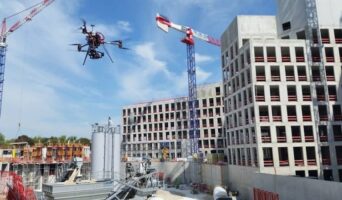THE USE OF DRONES IN CONSTRUCTION SITE MANAGEMENT
The Use of Drones in Construction Site Management
Drones, once a novelty gadget for hobbyists and tech enthusiasts, have now found a valuable role in the construction industry. These unmanned aerial vehicles (UAVs) have become indispensable tools for construction site management, offering a wide range of benefits that improve efficiency, safety, and cost-effectiveness. In this article, we’ll explore the key points regarding the use of drones in construction site management.
1. Aerial Site Surveys and Mapping
Drones have revolutionized the way construction sites are surveyed and mapped. Traditional survey methods can be time-consuming and expensive. Drones equipped with high-resolution cameras and LiDAR technology can rapidly capture aerial imagery and generate detailed 3D maps, providing valuable data to construction teams. This data helps in project planning, site analysis, and accurate measurements, allowing for better decision-making.
2. Progress Monitoring
Construction projects involve multiple phases, and monitoring progress is crucial to ensure that the project stays on track. Drones equipped with cameras can capture high-definition images and videos of the site, providing a visual record of the construction’s evolution. This real-time data allows project managers to assess progress, identify issues, and make timely adjustments to keep the project on schedule.
3. Safety Inspections
Safety is paramount in construction. Drones play a vital role in enhancing safety by conducting inspections of hard-to-reach or potentially hazardous areas. They can inspect tall structures, rooftops, and other challenging locations without putting personnel at risk. This proactive approach to safety not only protects workers but also reduces insurance costs and potential delays due to accidents.
4. Site Security
Construction sites are susceptible to theft, vandalism, and unauthorized access. Drones equipped with surveillance cameras can patrol the site during non-working hours, providing 24/7 security monitoring. In the event of suspicious activity, they can capture footage and alert security personnel, helping to prevent theft and damage.
5. Environmental Impact Assessments
Environmental considerations are becoming increasingly important in construction. Drones are used to conduct environmental impact assessments by capturing data on land erosion, wildlife habitats, and other ecological factors. This information helps construction companies minimize their environmental footprint and comply with regulations.
6. Inventory Management
Drones can be employed to track and manage inventory levels on large construction sites. Using RFID technology or barcode scanning, they can quickly identify the location and quantity of materials and equipment, preventing delays caused by shortages or misplaced items.
7. Time and Cost Savings
The use of drones in construction site management results in significant time and cost savings. By streamlining surveying, progress monitoring, and inspections, projects can be completed more efficiently. This not only reduces labor costs but also minimizes the risk of delays and costly rework.
8. Improved Communication
Drones facilitate better communication among project stakeholders. Aerial imagery and videos provide a clear overview of the site’s status, helping owners, investors, and project managers make informed decisions. Additionally, drones allow for remote collaboration, making it easier to share information with off-site teams.
9. Future Innovations
The use of drones in construction is an evolving field with ongoing technological advancements. Beyond their current applications, drones are being developed for tasks such as 3D printing, automated building inspections, and even delivering materials to remote construction sites. As technology progresses, drones will continue to play a more significant role in reshaping the construction industry.
In conclusion, drones have become indispensable tools in construction site management. They offer benefits ranging from improved safety and security to cost and time savings, making construction projects more efficient and effective. As technology continues to advance, the role of drones in the construction industry will only expand, further enhancing the way we plan, execute, and monitor construction projects.


